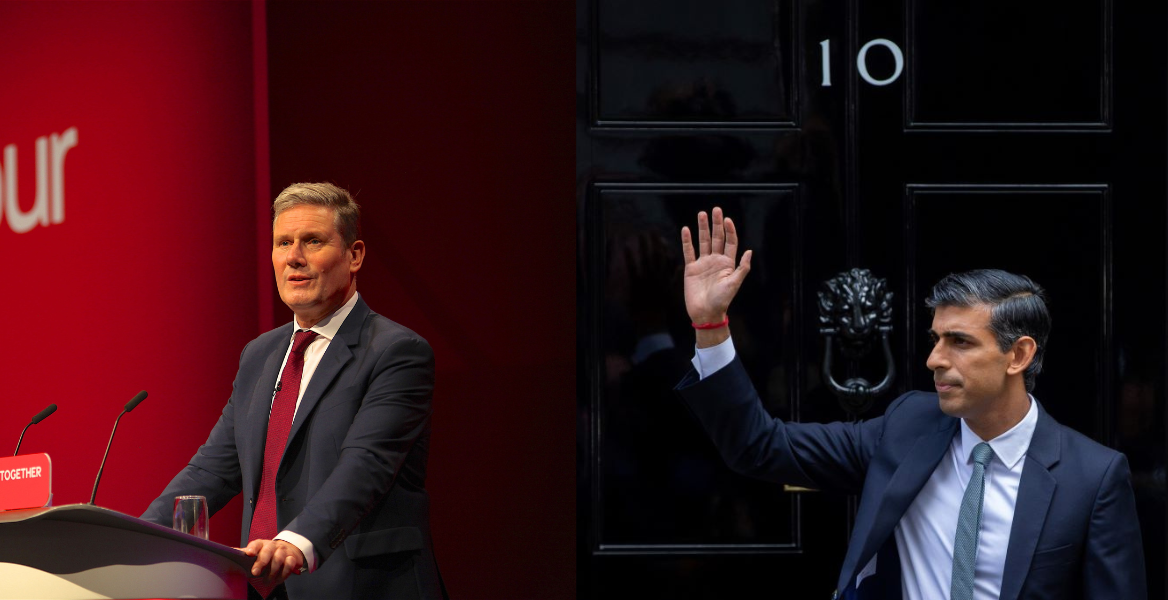
It’s less than two weeks since Rishi Sunak stood in the rain in Downing Street and announced that a General Election would be held earlier than expected on July 4th. Today, Mr Sunak and the man challenging him to be Prime Minister, Sir Keir Starmer, will go head-to-head in the first live TV debate of the campaign. It’s a big moment for both men, their parties and the millions of voters making up their minds, but can it deliver anything that makes a difference to the election result?
Ever since Gordon Brown agreed to share a stage with David Cameron and Nick Clegg in the run-up to the 2010 General Election, TV debates have been a fixture of the UK’s electoral cycle. But opinion is split on whether the then Labour Prime Minister ushered in a new era of scrutiny and accountability, or burdened his successors in Number 10 with a risky, time consuming ritual they would rather do without. Whether they like it or not, it has become customary before an election for the leaders of the main parties to square up against their rivals on live television and face the sort of sustained questioning they’re able to avoid for most of their time on the campaign trail.
Sometimes there’s fireworks – debates have the potential to supercharge a campaign, change the narrative and sway undecided voters. In 2010 the little known Liberal Democrat Leader Nick Clegg went from relative political obscurity to being a household name following the TV debates, denting the Conservatives share of the vote and perhaps denying David Cameron a majority. Sometimes however, they’re a damp squib and don’t seem to shift the dial. Boris Johnson and Jeremy Corbyn’s encounters in the 2019 campaign did little to shake-up a campaign which was overwhelmingly fought, won and lost on the issue of Brexit.
For broadcasters, TV debates are a showpiece moment of their campaign coverage. There are weeks, perhaps months of negotiations with the main parties about the venue, format, timing and participants. The host and production team will be working hard to find ways to ensure the audience hear more of the men in contention to be Prime Minister than just the slogans and party lines the leaders want to land. The parties invest a huge amount of time and money in preparation too: aides are drafted in to play the opponent, attack lines are tested and answers to every conceivable question rehearsed.
This first major debate of the campaign feels like Sir Keir Starmer’s to lose. Labour have a significant lead in opinion polls and the expectation in Westminster and beyond is that the party will win a majority. Therefore he will likely continue the ‘safety first’ strategy Labour have adopted with a simple “time for change” message, while attempting to reassure people that he and his party can be trusted with the economy. Sir Keir has a job to do, by his own admission, to win over large numbers of people who remain unconvinced. He’ll have to work hard to counter suggestions he caved in to the Labour left by allowing Diane Abbot to stand and shore up support from those disillusioned with the party’s stance on Gaza.
For Rishi Sunak, the challenge is different – to convince voters that after 14 years of power the Conservatives are still best placed to be in government and deserve another shot. Expect the Prime MInister who, on the basis of the opinion polls, has far less to lose, to be in attack mode and attempt to discredit his opponent as much as possible. The Tories have announced a raft of new policies designed to appeal to their core support base which haven’t always held up to scrutiny particularly well – so Mr Sunak may choose to focus largely on the economy where he and his team see him as most credible and effective.
TV is as much (if not more) about how you look as what you say – so there’s huge pressure for both men to come across in a way that connects well with voters. Will Rishi Sunak resist his tendency to appear tetchy at times? Can Sir Keir Starmer show the passion and personality that his critics say he lacks?
Whatever happens the debate will dominate the news agenda for at least the following 24 hours. Front pages, TV and radio bulletins and social media feeds will be full of it. That’s another reason why the stakes are so high for the party leaders – neither will want to be trending for the wrong reasons with an embarrassing gaffe, but will hope a clip of them getting one-up on their opponent can achieve some much-needed traction online.
If Sunak and Starmer stick to their scripts, the headlines on Tuesday night and Wednesday morning won’t be a surprise to anyone. But the best thing about live TV debates is that anything can happen. Something unexpected, a moment that reveals more about them and their politics than they’d planned, a flash of spontaneity in an otherwise tightly controlled campaign. That’s why I’ll be watching, along with a few million more.
Headland has partnered with LabourList, one of the leading authorities on the Labour Party to launch the first UK constituency map of Labour’s General Election candidates. View the map here.
Read more Insights & News
